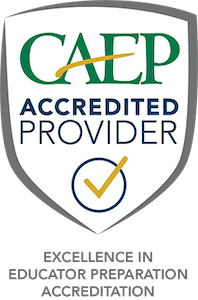Education Accreditation
The College of Education and Professional Development (COEPD) at Marshall University was awarded Accreditation by the Accreditation Council of the Council for the Accreditation of Educator Preparation (CAEP) on April 29, 2019.
Why It Matters
According to CAEP (2021), educator accreditation is a seal of approval that assures quality in educator preparation. Accreditation makes sure that educator programs prepare new teachers to know their subjects, their students, and have the clinical training that allows them to enter the classroom ready to teach effectively.
Accreditation provides a framework that has pushed educator preparation programs to continually self-assess and conduct an evidence-based analysis of their programs and their efficacy. These evidence-based shifts, rooted in continuous improvement, are helping to ensure that preparation programs are more likely to produce successful educators.
Accreditation matters to:
- P-12 Learners – outcomes-based evidence means all learners are at the center of determining the effectiveness of educators.
- Teacher Educators – since the process is infused with research and development, the knowledge base of effective practice will grow.
- State education agencies – provides a strong partner for quality assurance, helps connect the national consensus on preparation to state-level policy and provides support for a state’s own authorization/accountability system.
- Education Professionals – rigorous standards elevate the profession.
CAEP Accountability Measures
CAEP has four accountability measures which are used to provide information to the public on both program outcome and program impact. The information below provides the four CAEP measures with links to supporting evidence for each measure.
Impact and Outcome Measures
CAEP Standard Alignment: R4.1: Completer Effectiveness
| Measure | Supporting Evidence |
|---|---|
| Case Study of First-Year Out Completers: A case-study approach to document completers’ impact on student learning and development and on completers’ teaching effectiveness. | 2021 Case Study |
| Teacher in Residence: The Initial Level of the COEPD currently participates in the Teacher-in-Residence (TIR) program with sixteen (16) WV counties. The TIR Program is an intensively supervised and mentored residency program for prospective teachers during their senior year that refines their professional practice skills and helps them gain the teaching experience needed to demonstrate competence as a prerequisite to certification to teach in the West Virginia public schools. Teacher-in-Residence Programs require authorization of the WVBE pursuant to W.Va Code 18A-3-1(e). | 2021-22 TIR Results |
| Initial-Level Student Teacher Capstone Evaluations: Capstone Evaluation Results for Academic Year 2020-2021. | 2021-22 Capstone Results |
Initial-Level
CAEP Standard Alignment: R4.2: Satisfaction of Employers and R5.3: Stakeholder Involvement
| Measure | Supporting Evidence |
|---|---|
| Third-Year Employer Survey (Initial): The Third-Year Employer Survey was designed to evaluate third-year initial-level completers of the Marshall University College of Education and Professional Development who are employed as certified teachers. | 2021 Third-Year Employer Survey Data |
| First-Year Employer Survey (Initial): The Third-Year Employer Survey was designed to evaluate third-year initial-level completers of the Marshall University College of Education and Professional Development who are employed as certified teachers. | 2021 First-Year Employer Survey Data |
| Educational Personnel Preparation Advisory Committee (EPPAC): This committee is mandated by the West Virginia Department of Education (WVDE) and defined in Policy 5100: Preparing Educational Personnel as follows: “EPPAC serves as an advisory body to the institution’s chief educational personnel preparation officer in developing and reviewing all programs and policies for the preparation of educational personnel within the institution.” EPPAC will provide a framework for data-informed continuous improvement efforts and a lens for program analysis and reflection. | 2020-21 EPPAC Minutes |
Advanced-Level
CAEP Standard Alignment: RA4.1: Satisfaction of Employers
| Measure | Evidence Source |
|---|---|
| Third-Year Advanced-Level Employer Feedback |
2020-21 Results for: |
| First-Year Advanced-Level Employer Feedback |
2020-2021 Results for: |
CAEP Standard Alignment: R3.3/RA3.4: Competency at Completion
| Measure | Evidence Source |
|---|---|
| Praxis Scores: Praxis Scores for Academic Year 2020-2021. | 2021-22 Praxis Scores |
| NExT: West Virginia Common Metrics Exit Survey (Initial): The Exit Survey collects information on student teachers’ perceptions of and satisfaction with their teacher education programs and student teaching experiences as well as their backgrounds and future plans. | 2020-21 NExT Results |
| Level III Clinical Evaluation Results (Initial): Level III placements require a final evaluation completed for each placement by the university supervisor and cooperating teacher. The evaluation is based on the WV Professional Teaching Standards and National Content Standards. The university supervisor and cooperating teacher will complete several observations during the placement, which will aid them in completing the final evaluation. | 2020-21 Level III Clinical Evaluation Results |
| West Virginia Teacher Performance Assessment (Initial): The West Virginia Teacher Performance Assessment (TPA) is a collaboratively developed assessment that is completed by all candidates during the culminating internship/student teaching experience. The TPA requires that teacher candidates draw on pedagogical and content pedagogical knowledge to plan and deliver instruction that builds on each student’s strengths, needs, and prior experiences. Through this performance assessment, teacher candidates provide credible evidence of student impact. | 2021-22 TPA Results |
| Measure | Evidence Source |
|---|---|
| Ability of Completers to be Hired in Educational Positions (Initial & Advanced) | Ability to be Hired |


